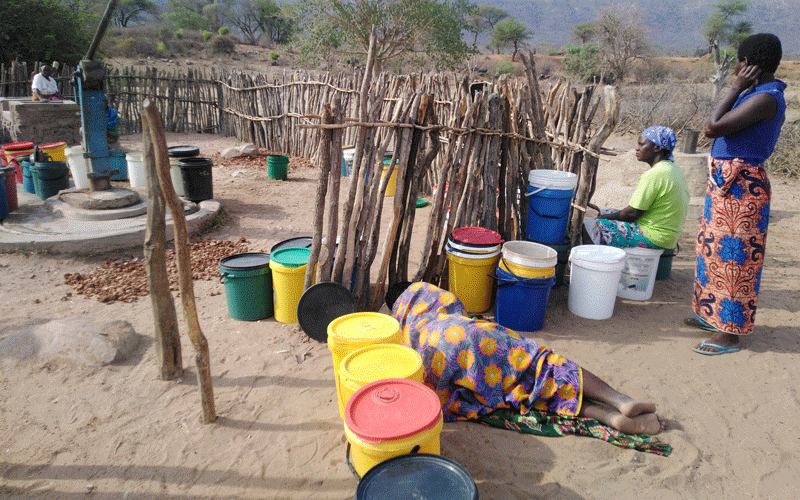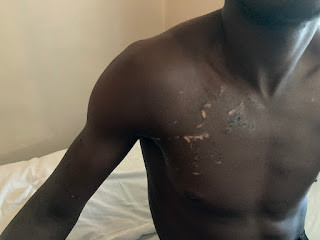
With a baby on her back Tutembaleza Dayidayi carries on her head a 20-litre plastic bucket of water, something she has become accustomed to in the past two decades.
Dayidayi from Tshilikwa 4 village in Lubanda (ward 13) under Chief Dobola in Binga just like most women in her community wake up at dawn to fetch water from shallow wells dug along the riverbed, popularly known as mumusena amulonga in community lingo.
Lubanda is among villages in Binga that suffer persistent water shortages, owing to dearth of water infrastructure and sporadic borehole breakdowns.
“We always rely on the shallow wells that we dig along the river beds, especially during the dry season when water would have dried up from our local dam as a result of evaporation,” said Dayidayi.
“We don’t have a borehole in the area so at times we go and fetch water from the other village, but the borehole has intermittent breakdowns forcing us to go to the nearby river.”
Dayidayi said in most cases women and children carry the responsibility of digging these wells and fetching water.
Effects of climate change
Climate change is taking a toll on the lives of many women and children in marginalised communities, particularly in drought-prone areas, who are now struggling to survive.
- Secure your business premises: Police
- New law answers exhumations and reburials question in Zim
- DT Bio Mudimba: A sungura perfectionist
- Travelling & touring: Gandavaroyi Falls: Tourism’s hanging fruit
Keep Reading
The uneven distribution of water resources — the result of erratic rainfall and varying climate — has divided the country into areas of plenty of water resources and areas of extreme water scarcity and stress.
Provinces such as Mashonaland, Manicaland and parts of Midlands have abundant water resources, while Matabeleland region and the south western parts of Masvingo province suffer chronic shortages because they experience erratic rainfall.
The situation has been exacerbated by the El-Nino induced drought that has hit most parts of southern Africa.
Binga lies in a low rainfall region and most of the boreholes and wells are seasonal resulting in increased pressure for water during the drier parts of the year.
The district requires more boreholes as the existing ones are not enough, villagers said.
Dayidayi said apart from water shortages, sanitation levels in her community were very low.
“We don’t have a toilet at home and we practice open defecation,” she said.
“It’s something that is prevalent in the area, although it is something difficult for us women,”
A 2017 Matabeleland North Risk District Profiles report compiled by the government with support from the World Food Programme and the Food and Nutrition Council said sanitation levels were very low with less than 10% of the population in Binga district having access to a toilet, which is way below the national average.
Proportion of households that own hand washing facilities was reported to be insignificant, only 1.2%, and there is a need for initiatives to promote safe sanitation facilities, the report said.
It’s a national phenomenon
Across provinces, Siboni Sairayi, a mother of five, who lives in Shumba village in Mwenezi ward 14, is one of the myriad of women in the district, who bear the brunt of a water crisis.
Mwenezi district is located in agro-ecological region IV, with an average rainfall of 540mm per annum and high temperatures above 25°C in the summer season.
The perennial water problems affect Sairayi and other women directly as they burden them with the additional tasks of fetching water from distant places.
“We wake up early every morning with my daughters to go and fetch water at a local borehole,” she told The Standard.
“Normally, we come back after three hours and the girls have to prepare to go to school and in most cases they would be tired.”
According to a recent report from Unicef and the World Health Organisation, 2,1 billion people around the world have no access to clean and safe water.
Locally, over 0.8 million people lack access to basic drinking water services, while one in five households lack access to a toilet hence openly defecating.
And the task of providing water for households falls disproportionately to women and girls, especially in rural areas.
A United Nations survey of 177 countries pointed out that women spend an estimated 40 billion hours in a year collecting water, which has incapacitated their efforts to engage in other productive and reproductive activities.
Sairayi said the water problems bedeviling their area were caused by a shortage of boreholes in the village.
Funding gaps and priorities
The dearth of water, sanitation and hygiene (Wash) services in Binga and Mwenezi as well as other marginalised districts in the country is attributed to the government's failure to invest in the Wash sector.
Despite the government having committed to sustainable water and sanitation for all by 2030, successive budget allocations for Wash have had a very small proportion of the general budget and the gross domestic product.
In the 2024 national budget about $204.9 billion was set aside for borehole rehabilitation and drilling programmes through the Zimbabwe National Water Authority (Zinwa) and Rural Infrastructure Development Agency (Rida), including further procurement of drilling rigs.
“These interventions will be complemented by investments under the Presidential Rural Development Programme, whilst local authorities are expected to identify water supply and sanitation projects to be supported through the intergovernmental fiscal transfers allocations,” while announcing the budget late last year.
“The (Wash) sector also is expected to receive development assistance amounting to US$7.9 million in 2024 towards sustainable, climate resilient and scalable Wash services, as well as support from the People’s Republic of China, who have pledged to drill 300 boreholes in the districts that were affected by Cyclone Idai.”
The 2024 national budget also supports dam construction projects amounting to $389 billion with priority being on the completion of Gwayi-Shangani dam and pipeline.
Other targeted dams include Kunzvi dam with the associated treatment plant and pipeline, Ziminya, Tuli-Manyange, Bindura, Semwa, Silverstroom and Vungu dams.
Wash sector remains critical, but overlooked
Development and public health experts said budgetary allocations for Wash have been significantly lower to close the Wash service needs.
They said the government has over the years failed to meet the Ngor Declaration target of allocating 0.5% of GDP to sanitation and hygiene budget lines, or the sanitation and water for all commitment to allocate 7% of the budget to Wash.
“The water security issues are characterised by a number of issues and irresponsible extraction of mineral resources is one, inadequate funding and lack of prioritisation of Wash by the responsible authorities,” said natural resources governance and climate change expert Tapuwa O'bren Nhachi.
“The government might have done some Wash activities in rural areas, but I can testify that there are some gaps that need to be filled.
“A lot of work needs to be done in that sector where non-governmental organisations and other development partners have done well.
“Resource allocation to critical areas such as Wash in Zimbabwe has been a challenge and for many years this has been the criticism of the national budget.”
Nhachi said there was a need for a strong political commitment to issues that matter like Wash.
Community Water Alliance coordinator Hardlife Mudzingwa said Wash in rural areas was a serious challenge.
“At national level government funding for Wash moved a bit up to 4,5% of the national budget, but still that funding is too little to cover serious gaps on access to sustainably managed Wash services,” he said.
“Rural areas, unlike urban areas, have no meaningful revenue generation from potable water and this compromises funding for Wash services.
“Government from national level to local authority is not doing enough in terms of funding for Wash and the target that the government set for themselves is that not less than 7% of the national budget should fund access to Wash services, but in 2023 only 4% was allocated towards Wash.”
Mudzingwa said weak Wash systems and funding gaps affected women in rural areas the most.
“Women fulfil unpaid domestic care work that includes fetching water and in rural areas women travel long distances to fetch water. The burden is unbearable,” he said.
“While women fulfil unpaid domestic care work, men will be engaging in income generating activities and this creates a huge gap in economic position between men and women.
“The acquired wealth is used to subject women to the whip and whim of women and in rural communities where gaps on Wash exist, cholera has wreaked havoc and women are left home caring for the sick.”
Mudzingwa said his organisation was advocating for the increase of the national fiscal Wash commitment to at least 15% of the national budget.
Public health expert Johannes Marisa said achieving SDG 3 (health and well-being for all) was a mammoth task for the country without adequate Wash facilities.
“If we improve water, sanitation and hygiene services we are likely to avert diarrhoeal disease, helminths and respiratory infections,” he said.
Diarrhoea is one of the leading causes of death in Sub-Saharan Africa, accounting for more than 700 000 deaths in 2019, almost half of the number of deaths due to diarrhoea globally (45%).
“Investment in water, sanitation and hygiene will save lives, cut the human, healthcare and economic costs of disease, advance gender equality and boost productivity in the country,” Marisa said.
Development experts said ensuring everyone has a toilet can generate US$86 billion annually in greater productivity and reduced health costs, preventing six billion cases of diarrhoea, globally.
Gender responsive budgeting way to go
Kumbirai Kahiya Chikowero, director of Girls and Women Empowerment Network Trust, a local women’s rights lobby organisation said national budgeting should be alive to the gendered needs of both men and women.
“As women we encourage gender responsive budgeting because it considers the needs of men and the needs of women and how much should be allocated,” Chikowero said.
“Having a budget that ensures funds are used in ways that reduce the burden of care work on women and girls as primary users of water, health facilities, sanitation facilities not just for themselves, but as domestic work and care providers.
“When such resources are not adequately budgeted for, women and girls are exposed to poor health for instance, lack of safe water means exposure to water borne diseases, which increases burden of care work on women and girls.
“Sensitive budgeting creates an environment where girls and women can save time, have time to improve their education as well as participate in development and decision making processes.
“Gender responsive budgeting ensures improved service delivery meaning citizens will not spend money and time on unproductive work.”
Chikowero said there were incidents of girls and women being violated at water points and girls being sexually-abused on their way from school due to long distances.
“Budgets that recognise girls and women’s needs will ensure schools and clean water is accessible within reasonable safe distances thereby minimising risks of abuse of women and girls,” she said.
*This story was produced with support from the WAN-FRA Women in News Social Impact Reporting initiative.










